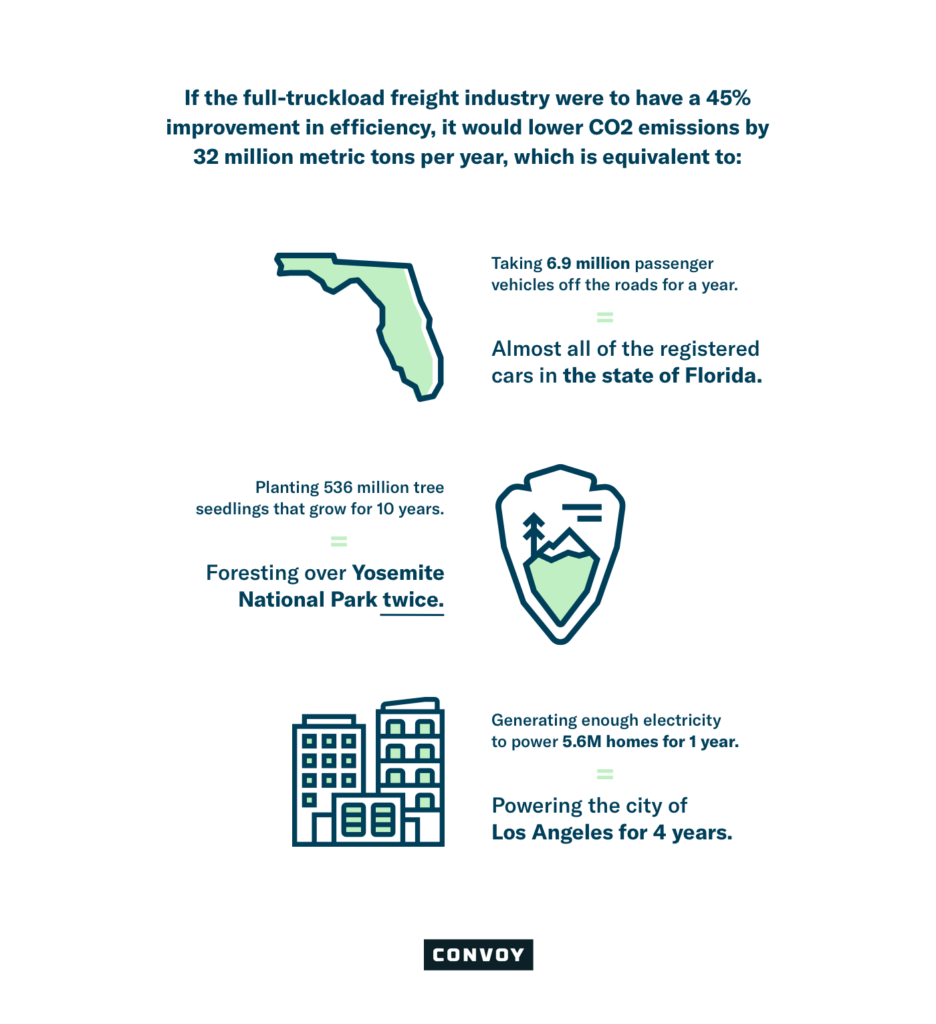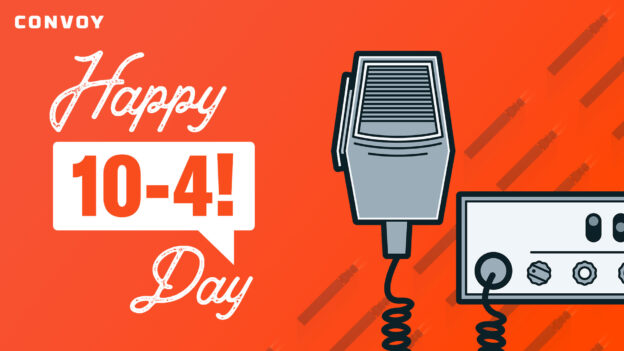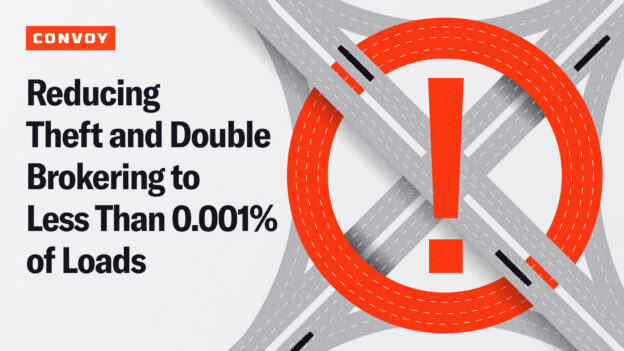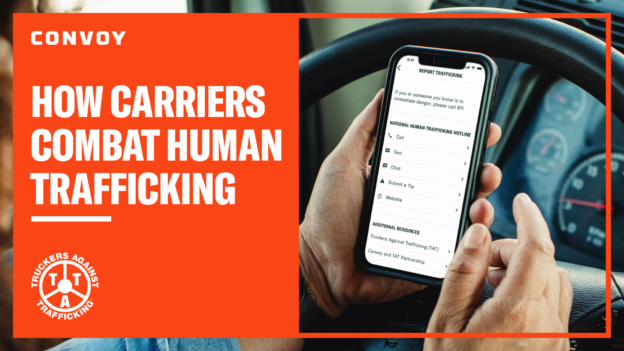Automated Reloads Are Reducing Empty Mile Carbon Emissions by 45%
Carriers, Freight Research, Shippers, Sustainability • Published on October 10, 2019
Today, Convoy is proud to share that bundling loads through our Automated Reloads program is yielding a 45% decrease in CO2 emissions from trucks running empty less often. Launched nationwide in June, Automated Reloads algorithmically groups multiple full-truckload shipments for carriers — minimizing empty miles, eliminating time wasted between loads, and lowering the resulting unnecessary carbon emissions. Over 50% of loads are now matched through this program in major lanes out of top freight markets such as Atlanta, Los Angeles and St. Louis.
Reducing waste in the freight industry is core to Convoy’s sustainability mission. Impact of waste from empty miles, wait times and delayed transit increases costs for shippers and carriers. But there are far greater consequences, beyond costs, in terms of damage caused to our environment. Convoy applies the resources we have — our business model, enhancements to our products, and our imaginations — toward tackling this waste.
AUTOMATION IS KEY TO REDUCING EMPTY MILES AND UNNECESSARY EMISSIONS
According to the U.S. Environmental Protection Agency, medium and heavy-duty truck freight in the United States accounts for 436 million metric tons of CO2 emissions per year. We estimate that about half of those emissions — 205 million metric tons, which are 13% of total vehicle emissions in the country — are from trucks in the full-truckload sector. Of the miles that these carriers drive, 35% are empty as they are forced to hunt across multiple brokers and load boards to keep their trucks full. This has been the case for decades, with no material progress towards reducing these empty miles.
Convoy’s technology is already reducing carbon emissions by connecting shipments more effectively. Through Automated Reloads, we automatically optimize how loads can be grouped in real-time by understanding each carrier’s unique preferences, hours-of-service availability and driver locations. Bidding their preferred rates on these pre-planned combinations (also referred to as “batches”) guarantees that carriers spend less time looking for work or driving empty, thus reducing carbon pollutants into our environment from when trucks run empty.
Convoy’s Automated Reloads program reduces empty miles from the industry standard of 35% to 19% by bundling shipments. If the entire industry were to achieve the same efficiency, it would lower CO2 emissions by 32 million metric tons, equivalent to taking 6.9 million passenger vehicles off the roads for a year. Today’s announcement reflects a 45% reduction in empty miles on average for carriers hauling Automated Reloads.[1]

SHIPPERS ARE PARTNERING WITH CONVOY TO ACHIEVE THEIR SUSTAINABILITY GOALS
Today, 74% of the S&P 500 have corporate environmental impact goals specific to sustainability and carbon reduction. Progress against these goals has historically come from places outside the shipping supply chain, such as investing in renewable energy or reducing excess packaging. Aligned with our mission to reduce waste, Convoy has become a key partner for companies like Waiakea, CHEP North America, and Anheuser-Busch in achieving their sustainability goals by digitally transforming their supply chain.
“By partnering with Convoy, we have used the benefits of their digital freight network to strategically batch our loads with the most relevant carriers to reduce the empty miles within our routes,” said Angie Slaughter, VP of Sustainability Procurement, Anheuser-Busch. “By reducing these miles, we improve the sustainability of our fleet – taking another step towards our ambitious sustainability goal of reducing carbon emissions by 25% by 2025 – and continue to lead the way towards greater efficiency in the transport market and within our own supply chain.”
CONVOY’S NETWORK EFFECT
As our business grows and more shipments are added to Convoy’s digital freight network, our machine learning algorithms identify live as well as drop-and-hook shipments to group together, and automatically create efficient routes personalized for each carrier. The resulting impact is lower carbon emissions from empty miles — an environmental benefit which will continually amplify as the footprint of Automated Reloads expands across Convoy’s network.
For Shippers:
Ready to reach your sustainability goals? Get started.
Already shipping with Convoy? Contact your Account Manager
For Carriers:
New to Convoy? Sign up today
Already hauling with Convoy? Open the Convoy mobile app or carrier web to search and book Automated Reloads loads today
[1]Research note: To estimate the carbon emissions and diesel fuel savings associated with Convoy’s Automated Reloads, we looked at the relationship between the empty (wasted) mileage associated with the average load for the industry and the average Convoy Automated Reload.
Given current average route distances and average distances between adjacent loads on Convoy’s platform, we estimate that for the typical load, the number of miles driven empty falls from 62 miles to 34 miles as a result of Automated Reloads. Assuming that the typical tractor has a fuel economy of 6.5 miles per gallon, and every gallon of diesel consumed emits 22.4 pounds of carbon dioxide, the per-load fuel and emissions savings associated with each Automated Reload on Convoy’s platform amount to 5.2 gallons of diesel or 117 pounds of carbon dioxide. Read more here



